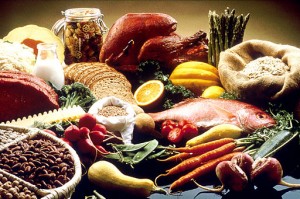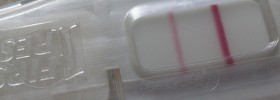Nutrition is an incredibly important element of maintaining a healthy pregnancy. Eating the right kind of food helps to control pregnancy weight gain and reduce the risk of obstetric complications. Avoiding certain risky foods is equally pertinent, as it reduces various, dangerous risks to both mother and baby.
Unfortunately, knowing what to indulge and what to avoid can be a complicated mission. With thousands of blogs, books, and forums pointing pregnant women in a dizzying array of directions, separating reality from opinion can be quite the challenge. For the most part, a mother who invests in healthy, fresh foods and maintains a well-balanced diet has little to worry about, even with an occasional cup of coffee or bowl of ice cream. Stressing over every little thing is far more likely to cause problems, then having a root beer float and some pizza every now and then. However, knowing the basics helps mothers to make informed decisions regarding the health of their child, as well as their own well-being.
Positive Indulgences
Protein, calcium, folic acid, Vitamin D, and iron are only a handful of the critical nutrients that are required during pregnancy. Taking a balanced prenatal vitamin before and during pregnancy, helps to make up for dietary shortfalls. However, fresh, whole foods are the best source from which to acquire these crucial elements.
Iron
Having an adequate supply of iron helps to stave off the risk of hemorrhage in labor, as well as ante- and postnatal anemia. It ensures an adequate supply of healthy red blood cells, builds muscle, develops bones, and strengthens cartilage. Clearly a crucial foundation for building a human life, a woman’s need for iron doubles during pregnancy.
Some healthy sources of iron include lean meats, most legumes, Swiss chard, black strap molasses, and folic acid-rich sunflower seeds.
Protein
The amino acids in protein make up the most fundamental building blocks of human life. They are critical for keeping pregnant women healthy and allowing their babies to develop properly. Other benefits include, keeping the mother feeling full longer and possibly reducing the risk of pregnancy induced hypertension. Most American women get an ample amount of protein, but some, particularly those who follow a vegetarian or strict vegan diet may fall short without careful planning. Most care providers recommend that pregnant women consume between 75 and 120 grams of protein each day.
Eggs are an excellent source of protein. Yogurt, cheese, milk, tofu, chicken, shrimp, and beans are all excellent sources or protein.
Calcium
Calcium not only helps to develop strong bones and prevent osteoporosis, it also plays an important role in heart health. There are many sources of calcium, which a pregnant woman needs around 1,000 grams of per day. Despite popular belief, many sources of calcium are non-dairy. So being a vegan or lactose intolerant does not guarantee a lack of vital calcium.
Some non-dairy, calcium-rich foods are broccoli, kale, almonds, and most dairy alternatives. For those who are not opposed to dairy, skim milk can be a good, low-fat source of calcium during pregnancy as well.
Folic Acid (Folate)
All women of childbearing age should consume around 400 micrograms of folic acid each day. This folic acid creates stores in the body, that a future fetus will consume during development. Most birth defects are developed during the first three to four weeks of pregnancy, before many women even know they have conceived.
During pregnancy women should continue to consume between 400 and 600 micrograms of folic acid. Though prenatal vitamins typically contain this much folic acid, if not more, dietary sources are also very important. Folic acid remains one of the most critical known components in preventing neural tube defects, such as Spina Bifida. In one study, women who consumed an adequate amount of this vital nutrient during pregnancy were up to 50% less likely to deliver preterm, another huge health benefit.
Sunflower seeds, spinach, liver, papaya, strawberries, and romaine lettuce are all good sources of this pregnancy super-food.
Water
Drinking water during pregnancy is crucial. Dehydration can lead to preterm labor and not getting enough water may increase the risk of pregnancy complications. Pregnant women should strive for 64 or more ounces of water each day. Some caregivers even recommend drinking about half as many ounces as one currently weighs. So a mother who weighs 175 pounds, should strive for closer to 87.5 ounces of water each day. If you are having trouble downing that much H2O everyday, try adding some lemon, cucumber, or a bit of 100% juice for a kick of flavor.
What to Avoid
Just as there are many healthy, worthwhile foods to enjoy before and during pregnancy, there are also a few that should be avoided or at least kept in moderation.
Seafood
Most seafood is fine during pregnancy and may even be beneficial. However, certain types of fish contain high levels of mercury which are dangerous to developing fetuses and should be avoided.
Avoid
- Marlin
- Orange roughy
- Tilefish
- Swordfish
- Shark
- Mackerel (king)
- Tuna ( bigeye, Ahi)
Want to know more about avoiding fish during pregnancy? The American Pregnancy Association offers a chart that provides detail information regarding what seafood to eat, what to avoid, and how to determine the level of mercury.
Alcohol
Alcohol can have a detrimental effect on a developing fetus. There is no universally agreed upon “safe” amount of alcohol during pregnancy. Considering the risk of fetal alcohol syndrome and the known side-effects of alcohol, it is best to save celebratory cocktails for after the birth. This does not mean giving up on a social life. There are some great “virgin” cocktail recipes out there for abstaining mothers-to-be.
Sugar
Nearly every pregnant woman comes to a point in her gestation where ice-cream is the vain of her existence. Pregnancy cravings are a powerful force to be reckoned with, and an occasional indulgence in a sugary treat is of little concern for most. However, it is best to look for healthful, natural, sugar-free alternatives when the sweet tooth comes to call. Eating too much sugar during pregnancy can increase the risk of developing gestational diabetes and cause excessive weight gain in mother and child. Furthermore, filling up on empty calories takes up a lot of room that could better be packed with healthy, nutritious supplements.
Caffeine
A small amount of caffeine, generally a cup of coffee or two a day is probably fine for most pregnant women. However, excessive caffeine consumption during pregnancy has been linked to an increased risk of miscarriage and birth defects. Caffeine also causes dehydration, zaps vital nutrients, raises blood pressure, promotes restlessness, and acts as a stimulant. In short, it is smart to avoid caffeine as much as possible during pregnancy, but do not beat yourself up if you occasionally fall off the wagon.
To learn more about nutrition during pregnancy visit the American Pregnancy Association.














A whole lot of thanks for sharing this fine piece. Very interesting ideas!
(as always, btw)